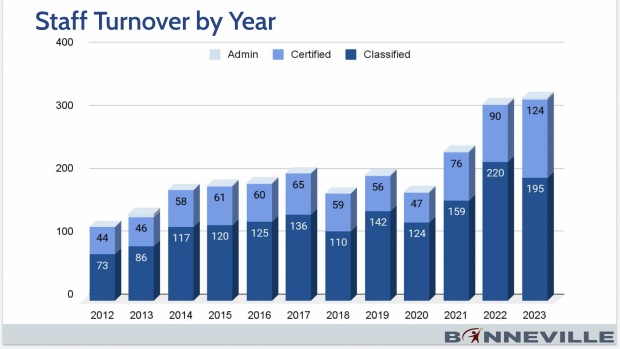IDAHO FALLS — Staff turnover in the Bonneville School District is higher than it’s been in more than a decade, and nearly half of all certified employees have six years of experience or less.
It’s fallout from a perfect storm of challenges facing school employees, officials say, including the pandemic, a lack of adequate training, and low wages.
Bonneville is one of many districts that have struggled to recruit and retain staff, from cooks and bus drivers to paraprofessionals and teachers. It’s led to hiring more employees who are inexperienced, and who are more likely to leave their jobs within five years.


The revolving door of new employees — especially teachers — impacts students’ education, and will continue to do so going forward if the problem isn’t resolved.
“As this Baby Boomer generation ages and hits retirement, are we finding or preparing enough teachers to fill the gap?” Heath Jackson, the district’s executive director of planning and personnel, said at a Sept. 13 board meeting. “We’re really in that crunch time right now… If we don’t keep these 0-10-year teachers in the profession, we’re not going to be able to provide the same educational opportunities.”
“We’re really in that crunch time right now … If we don’t keep these 0-10-year teachers in the profession, we’re not going to be able to provide the same educational opportunities.” — Heath Jackson, Bonneville’s director of planning and personnel
Jackson has suggested implementing job satisfaction surveys and exit interviews to better understand why school staffers are leaving and what would encourage them to stay. Building principals and supervisors will also start filling out a form each time someone resigns so the district can “gather more accurate information” about why they are leaving — beyond the common but too-vague explanation: “personal reasons.”

“There are a lot of growing pressures on our teachers in the classroom and we’re seeing more teachers leave the profession,” Jackson said. “It’s a little bit of a concern going into future years.”
Jackson said it’s been “eye-opening” to see the amount of employees resigning during their first five years. Last school year, over 100 resignations in the district were from people with less than five years of experience.
And when a sizable chunk of the district’s employees are inexperienced, it’s worrisome.

Jackson said turnover has been increasing since the pandemic, and he already knows some of the reasons:
- Employees leaving for districts with a four-day week
- Employees leaving for districts that opted in to the state insurance plan
- Employees moving out of the district
- Employees retiring at increasing rates
District superintendent Scott Woolstenhulme said the district is increasingly hiring teachers with alternate authorizations — meaning they didn’t go through a traditional college program to become teachers.
“They used to be an exception,” Woolstenhulme said, adding that it seems like half of new hires are now on alternate authorizations. “And as a result, they’re just not as prepared for the realities of the classroom.”
But there is some good news. This school year, the district provided $4/hour wage increases to all classified staff — funded by monies from the state and from a supplemental levy. The lowest wages jumped from $10.50 an hour to $14.50 an hour.
Jackson said the pay is still not competitive with the private sector, but it does help Bonneville compete with other districts. So far, the pay increase seems to be bringing in more classified staff members — which includes paraprofessionals, bus drivers, custodians, cooks, and servers.
“We’re seeing a much higher ability to hire employees this fall than we’ve had in the last two years.”
Idaho EdNews data analyst Randy Schrader contributed to this report.
